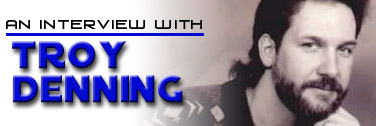
January 2002, by Scott Chitwood & Michael Potts

We recently had the opportunity to chat with Troy Denning, author of the New Jedi Order book "Star by Star". Troy has a long history with the Star Wars Expanded Universe starting from the earliest days of RPG to this latest novel.
If you have not read Star by Star yet, you may want to turn back. Spoilers from the book are openly discussed here.
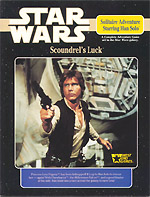
1. How did you originally get involved with the Star Wars franchise . . . ie: WEG RPG?
That was in 1987, writing "choose-your-path" game books for West End Games, which had the Star Wars role-playing game license at the time. I was working as an editorial director at another game company when an old college friend--Curtis Smith--became the R&D Director at West End. Knowing how much I loved Star Wars, he mentioned at a convention that they were looking for freelance writers and game designers for the system. One thing led to another, and a few weeks later I resigned from my editorial job to write Star Wars product.
West End published two of the game books, Scoundrel's Luck and Jedi's Honor, but I don't think they became part of the recognized EU history. It's pretty difficult to make a game book "official," since there are so many versions of every event. (Die-hard game buffs might be interested to know that there are two more "lost" game books somewhere in the West End archives, focusing, as I recall, on the adventures of Lando Calrissian and Princess Leia.)
What did become a recognized part of the EU is Galaxy Guide 4: Alien Races. I still get a secret thrill when I find one of those aliens in some other author's work, and see where he or she has taken the species. Basically, the assignment was to write descriptions for some of the aliens in the movies, and to invent a few new ones. I was the lead author on this, but we wanted to be sure the aliens were diverse, so Stephen D. Sullivan and Andria Hayday also contributed. It's much too far in the past to remember who wrote what, but I do seem to recall that Andria, who's now my wife, wrote the entry on the Hutts. Gotta love a woman who thinks like that.
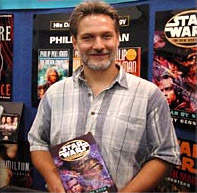
2. Can you describe the collaborative process with the NJO? Most authors have described this as a very enjoyable experience . . . what made that so?
Describing the NJO collaborative process is a bit like the proverbial blind men trying to describe an elephant--no single person can relate the whole picture. It starts with the NJO "bible"--a huge compendium of outlines, glossaries, character descriptions, etc. Then each author writes an outline, which gets reviewed, revised, approved, and added to the next version of the bible--as do any new terms, characters, etc. introduced in recent books.
The NJO bible is, of course, an enormous undertaking--but only a small part of the story. Most of the real work takes place in emails and phone conversations between small groups of people. The brainstorming is great fun. Everyone talks to everyone--Del Rey and Lucasfilm editors to each other, editors to authors, authors to authors, and somehow Shelly Shapiro and Sue Rostoni keep it all straight. Obviously, they have many good people working with them--Kathleen O'Shea and Chris Cerasi are just two who leap instantly to mind--but coordinating so many authors on such a huge project must be like herding cats. They do a remarkable job.
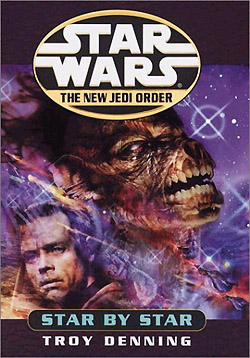
3. How much creative freedom do you receive when writing a Star Wars book? Was there anything specific that you wanted to do that you weren't allowed to?
One of the fun things about writing in a shared world is the challenge of working a story into an overarching framework. Usually, the author is given a set of goals and a list of parameters. As long as you accomplish the goals and stay within the parameters, you'll have all the creative freedom you want. That was certainly the case with Star by Star.
For example, Lando has always been one of my favorite Star Wars characters, and I really wanted to have him play a pivotal part in the book. So, he was the one who ferries the strike team into Yuuzhan Vong territory, and his war droids were crucial in foiling a certain senator's plan near the end. Another good example is Saba Sebatyne and her Barabel Jedi. The Barabels have always been a favorite species of mine--they're way tough--and I wanted to introduce some characters who could provide a little levity in the darkest moments of the story. The result was Saba Sebatyne and her apprentices.
As for anything specific I wasn't allowed to do . . . let's just say Kyp Durron is a very lucky man.
4. What made you choose Anakin as the character to die, over say, Jacen or Jaina? Was this decided before you came on board?
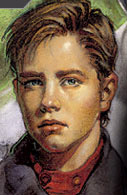
People must be curious about this, but I don't want to go into detail because of the ramifications it may have for the rest of the series. I think it's safe to say this was one of the goals I was given at the outset, and that because the reasons behind the decision were very sound, it never crossed my mind that anyone other than Anakin should die.
5. What are your thoughts on the religion and society of the Yuuzhan Vong? How did you approach writing these characters?
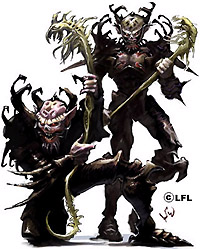
Well, the Yuuzhan Vong are pretty gruesome, aren't they? R.A. Salvatore introduced a species that was menacingly alien and hauntingly familiar, then Jim Luceno and the other authors ahead of me all did a wonderful job adding the philosophical underpinnings and exploring the society. By the time Star by Star came around, all I had to do was look at the Yuuzhan as total beings and try to understand what makes them tick individually, just like I would any other character. That's the approach I took--not that they were aliens or villains, just characters struggling to get what they wanted.
6. What did you think of Episode I? What do you hope to see in Episode II? Do you avoid movie spoilers or read them?
I'm such a fan that there was never any doubt I'd like Episode I. I saw it three times in the theater, then bought the video and watched it several more times. (I was already contracted to write Star by Star, so I was able to convince myself this was research.) As for what I hope to see in Episode II--two words: Jedi fights.
Spoilers? I avoid them like the plague. I want to be surprised. I don't even like trailers. In fact, I've avoided the Harry Potter movie because of the Episode II trailer.
7. R.A. Salvatore got a bad response from some fans after writing the death of Chewbacca. Were you concerned about the reaction of fans to the death of Anakin Solo? What have you thought of reader response so far?
I think the vast majority of readers liked Vector Prime as much as I did and reacted accordingly, so I just tried to write another good story and not worry about negative reaction. Actually, the fans have treated me well. Most comments I've seen are positive, and of those that aren't, almost all have been thoughtful and polite. That's fair.
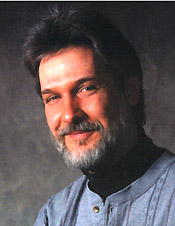
8. Can you share with readers how you prepare for writing a Star Wars book? What material do you use to research the massive volume of backstory, history, information? What does Lucasfilm and Del Rey provide in assistance?
First, I do the obvious--read all of the material that touches on my story.
There's also secondary research. To create a realistic feel, I need to understand how my characters are shaped by their environment. In Star by Star, it was obvious from the start that the story would involve commando-type action and major space combat. So I did a lot of military reading--everything from books on SEAL teams to the history of jet fighters to weapons of the future. This last was pretty incredible, actually. Some of the stuff the military is developing now would make stormtroopers seem under-equipped.
Del Rey provides the current Star Wars reference material. The Essential Guides and Star Wars Encyclopedia are absolute musts. The Encyclopedia was such a lifesaver that I asked Steve Sansweet to autograph it for me at last year's Gen Con. More importantly, there's the expertise of everyone who reads the manuscript in its various drafts; Shelly, Sue and her readers at Lucasfilm, the copyeditors (and others) at Del Rey. Everyone catches something, and it would be difficult to overestimate how much embarrassment they save a Star Wars author.
9. What are your influences in your writing career? What were your favorite books and authors when growing up?
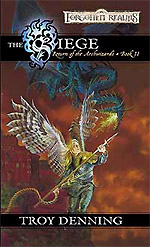
I like books that move--in almost any genre--so those are the kind I try to write. There are probably other influences, but that's the only one I'm aware of consciously.
Growing up, I was a big science fiction and fantasy reader--Tolkien, Edgar Rice Burroughs, Clark, Asimov, Heinlein, almost anything with a sword or a spaceship on the cover. Now, if an author holds my interest over two or three books, I enjoy reading the entire body of work to see how he or she has grown over time.
10. Will you be writing any future Star Wars stories? What are your other future writing plans?
I love writing Star Wars stories, so it seems likely I'll be doing more. Outside the EU, I'll be finishing up my Return of the Archwizards trilogy in the Forgotten Realms, then turning my attention to a pet fantasy project that I'm finally finding the time to put on paper.
Thanks to Troy for taking the time to chat with us!
If you'd like to ask him some questions yourself, Troy Denning is hanging out in our Literature Forum in this thread answering reader's questions. Be sure to check out what he has to say and also submit your burning questions!